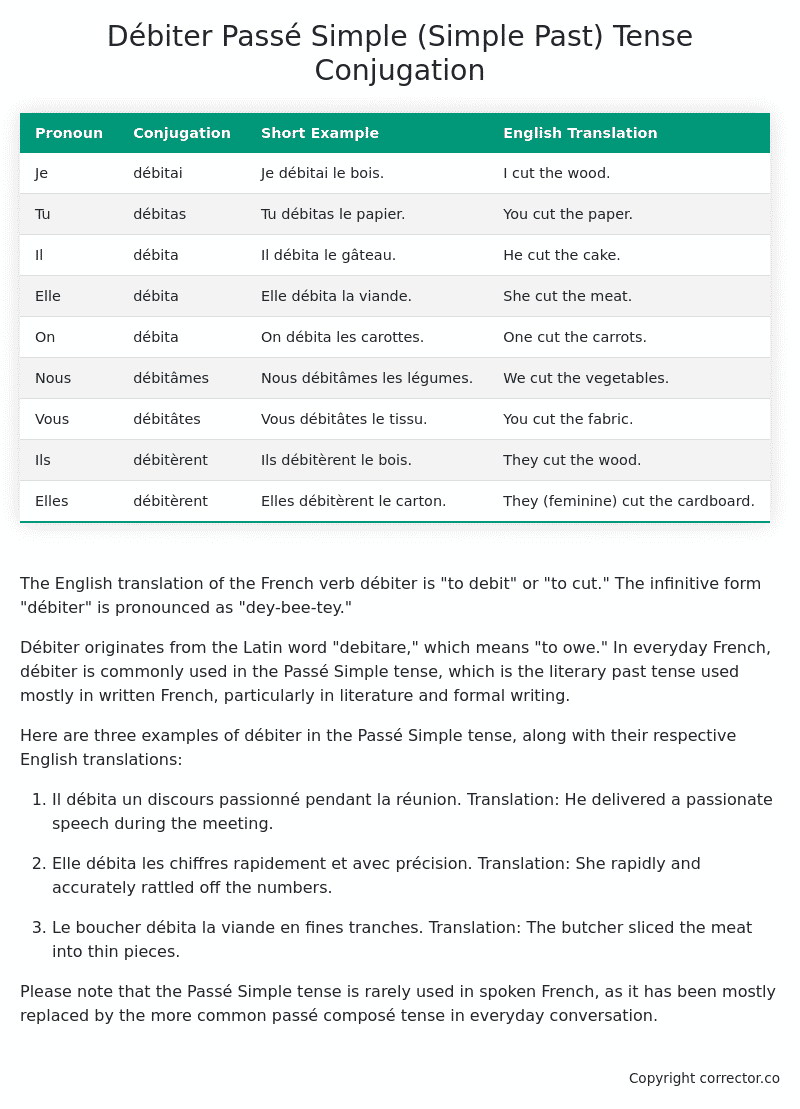Passé Simple (Simple Past) Tense Conjugation of the French Verb débiter
Introduction to the verb débiter
The English translation of the French verb débiter is “to debit” or “to cut.” The infinitive form “débiter” is pronounced as “dey-bee-tey.”
Débiter originates from the Latin word “debitare,” which means “to owe.” In everyday French, débiter is commonly used in the Passé Simple tense, which is the literary past tense used mostly in written French, particularly in literature and formal writing.
Here are three examples of débiter in the Passé Simple tense, along with their respective English translations:
-
Il débita un discours passionné pendant la réunion.
Translation: He delivered a passionate speech during the meeting. -
Elle débita les chiffres rapidement et avec précision.
Translation: She rapidly and accurately rattled off the numbers. -
Le boucher débita la viande en fines tranches.
Translation: The butcher sliced the meat into thin pieces.
Please note that the Passé Simple tense is rarely used in spoken French, as it has been mostly replaced by the more common passé composé tense in everyday conversation.
Table of the Passé Simple (Simple Past) Tense Conjugation of débiter
| Pronoun | Conjugation | Short Example | English Translation |
|---|---|---|---|
| Je | débitai | Je débitai le bois. | I cut the wood. |
| Tu | débitas | Tu débitas le papier. | You cut the paper. |
| Il | débita | Il débita le gâteau. | He cut the cake. |
| Elle | débita | Elle débita la viande. | She cut the meat. |
| On | débita | On débita les carottes. | One cut the carrots. |
| Nous | débitâmes | Nous débitâmes les légumes. | We cut the vegetables. |
| Vous | débitâtes | Vous débitâtes le tissu. | You cut the fabric. |
| Ils | débitèrent | Ils débitèrent le bois. | They cut the wood. |
| Elles | débitèrent | Elles débitèrent le carton. | They (feminine) cut the cardboard. |
Other Conjugations for Débiter.
Le Present (Present Tense) Conjugation of the French Verb débiter
Imparfait (Imperfect) Tense Conjugation of the French Verb débiter
Passé Simple (Simple Past) Tense Conjugation of the French Verb débiter (You’re reading it right now!)
Passé Composé (Present Perfect) Tense Conjugation of the French Verb débiter
Futur Simple (Simple Future) Tense Conjugation of the French Verb débiter
Futur Proche (Near Future) Tense Conjugation of the French Verb débiter
Plus-que-parfait (Pluperfect) Tense Conjugation of the French Verb débiter
Passé Antérieur (Past Anterior) Tense Conjugation of the French Verb débiter
Futur Antérieur (Future Anterior) Tense Conjugation of the French Verb débiter
Subjonctif Présent (Subjunctive Present) Tense Conjugation of the French Verb débiter
Subjonctif Passé (Subjunctive Past) Tense Conjugation of the French Verb débiter
Subjonctif Imparfait (Subjunctive Imperfect) Tense Conjugation of the French Verb débiter
Subjonctif Plus-que-parfait (Subjunctive Pluperfect) Tense Conjugation of the French Verb débiter
Conditionnel Présent (Conditional Present) Tense Conjugation of the French Verb débiter
Conditionnel Passé (Conditional Past) Tense Conjugation of the French Verb débiter
Conditionnel Passé II (Conditional Past II) Tense Conjugation of the French Verb débiter
L’impératif Présent (Imperative Present) Tense Conjugation of the French Verb débiter
L’impératif Passé (Imperative Past) Tense Conjugation of the French Verb débiter
L’infinitif Présent (Infinitive Present) Tense Conjugation of the French Verb débiter
L’infinitif Passé (Infinitive Past) Tense Conjugation of the French Verb débiter
Le Participe Présent (Present Participle) Tense Conjugation of the French Verb débiter
Le Participe Passé (Past Participle) Tense Conjugation of the French Verb débiter
Struggling with French verbs or the language in general? Why not use our free French Grammar Checker – no registration required!
Get a FREE Download Study Sheet of this Conjugation 🔥
Simply right click the image below, click “save image” and get your free reference for the débiter Passé Simple tense conjugation!

Débiter – About the French Passé Simple (Simple Past) Tense
Formation
Usage
Narration
Historical Context
Interactions with other tenses
Passé Composé
Imparfait
Conditional and Subjunctive
Summary
I hope you enjoyed this article on the verb débiter. Still in a learning mood? Check out another TOTALLY random French verb conjugation!


